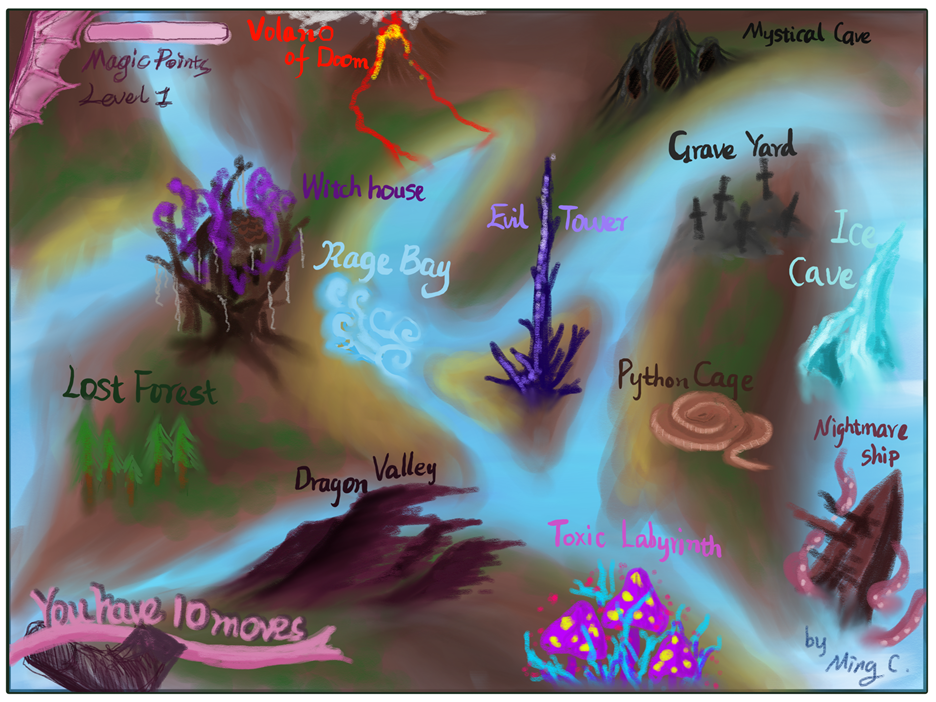
The academic work by the CREATE Lab at NYU on the effectiveness and the efficacy of using Computer games to train adolescents’ executive functions (a set of cognitive abilities that help people inhibit impulses, hold information temporarily in working memory, and switch between different rules or tasks) inspired me to work on EF games, though several meta-analyses provided contradictive evidence regarding the training effects of the EF games.
There are plenty of EF games on the market, however, many of them are the gamified version of some popular EF measurements, and the distinction between game-based training and gamified training tasks is not clear. Adding game elements (e.g., background story, incentives, cartoon-like UI, etc.) to existed or modified EF tests doesn’t necessarily turn the tests into games. With an intention of making real games for EF training, I try to find or create compelling game mechanics that are different from the existed EF measurements, which can also effectively enhance students’ executive functions. Regarding the target population of my game, young adults like undergraduates will be good since I am more familiar with this age group, and more studies are needed to investigate the EF development during young adulthood.
I am also interested in learning how strategic planning is related to the EF construct since when I play Clash Royale (a real-time strategy game), I found myself constantly suppressing my impulse of destroying the opponents’ troops for later advantages, remembering my opponents’ cards temporarily, and switching between different strategies. There is also some research evidence supporting the tight association between strategic planning and EF. Thus, I would like to design a game incorporating both strategic planning and EF training to see whether it can enhance young adults’ EF abilities well, which will also allow me to investigate the relationship between strategic planning and EF development.
Though I will shrink the scale of my original project, the major idea is to design a role-playing game with an adventure background story, and there will be several magical places involved in the story. Each magical place corresponds to one mini-game to train one EF component. I am thinking about making 6 EF mini-games instead of 12 considering the scale of this project. Each mini-game will have three difficulty levels, and the harder the level, the more magic points a player can earn. Players will also have limited moves in the game, and they need to strategically plan their moves to get the most magic points while finishing the storyline. Possibly, I will use this game for my dissertation, and by then, hopefully, I can make three versions of the game: one without moves and a risk-reward mechanic, one with moves but not the risk-reward mechanic, and one with both moves and the risk-reward mechanic. So, I can investigate the effect of the game mechanic which fosters strategic planning in training young adults’ EF. I am afraid this will be too complex for implementation. Hopefully, I can think of a better design that addresses my research interests as well as keeps the game makeable and playable after this semester.



Ming, this is a really smart idea — and seems like a really amazing intervention you can make into the realm of EF therapies and training. You might think of your ultimate project as a ‘proof of concept’ you can bring to game designers…because if you hit on something really effective, I suspect this project would really have legs.
Hello Stephen, thank you for your nice words! I agree that the first step is to develop a “proof of concept” or game design document. If making this game is out of my ability range, taking the design document to professional game designers will be more practical. However, I still want to work on at least some part of it since I enjoy the creating process.
This is really impressive and well thought out– excited to see it develop!
I’d be curious to hear your thoughts on how ITP specifically can help you with the project, given our readings and the interdisciplinary assemblage the course brings together. How can we help you?
Thank you for the compliment! I think this course can definitely help me in project management, scope reduction, the way how I think of game mechanics for educational purposes, and much more. The content for next week regarding the product delivery process interests me a lot. I don’t have much experience in running a complex project like this, and hopefully, this course can give me the knowledge and the motivation to keep on with my work. Besides, the content on play and games can inspire me on the invention of game mechanics in my game. More importantly, I hope through this class I can absorb ideas from other disciplines regarding how we should approach technology and games, and the peer feedback will also benefit my project a lot.
Hi Ming,
I love your idea and I really think it has great potential to have positive impact on students’ cognitive skills. I think your idea is well thought out and it could become a good teaching tool for educators as well, particularly since “each magical place corresponds to one mini-game to train one EF component”, making the gains that playing can have easier to distinguish. I do remember loving your project when you shared something about it last semester (it was visually stunning and I think that it would motivate players to at least try it for that reason alone), I think the game you are developing would appeal to many young people and older people as well, I am intrigued:)